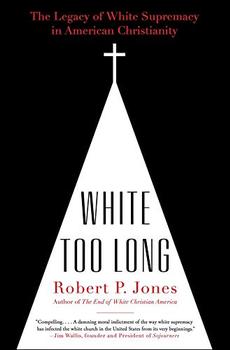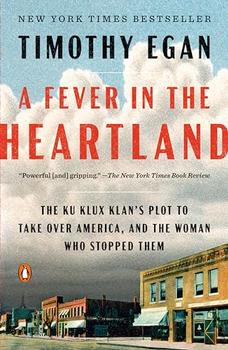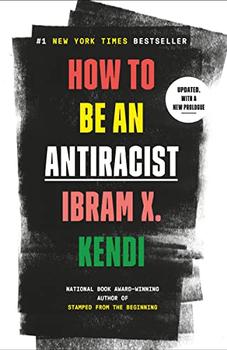Summary | Excerpt | Reviews | Beyond the book | Read-Alikes | Genres & Themes | Author Bio

Critics' Opinion:
Readers' Opinion:
First Published:
Jul 2020, 320 pages
Paperback:
Jul 2021, 320 pages
 Book Reviewed by:
Book Reviewed by:
Lisa Bintrim
Buy This Book
Religious scholar Robert P. Jones doesn't pull any punches in his latest book, White Too Long: The Legacy of White Supremacy in American Christianity: "White Christian churches have not just been complacent; they have not only been complicit; rather, as the dominant cultural power in America, they have been responsible for constructing and sustaining a project to protect white supremacy at the expense of black equality." Drawing on archival research, public opinion survey data and his own memories of growing up in the Deep South, Jones, founder and CEO of the Public Religion Research Institute (PRRI), builds a convincing case that white Christianity has played a central role in sustaining racist attitudes and actions in America.
Jones begins his unflinching examination in the mid-19th century, with the split of the Baptist church; the northern faction was opposed to slavery, while the southern faction saw slavery as part of God's intended plan. He then traces the role of churches — evangelical Protestant, mainline Protestant and Catholic — in white supremacy from Southern secession, to Reformation-era lynch mobs, to Jim Crow segregation, and through to 2018 public opinion polls. Along the way, he argues that white supremacist attitudes among white Christians are the norm, across geographic location and denomination, rather than the exception.
According to Jones, despite the official proclamations of churches at the national, institutional level in favor of racial justice, the theology of American Christianity provides the foundation for white supremacist attitudes. He describes the "cultural tool kit" of American Christians, formed by primal beliefs in individual free will, interpersonal relationships and personal sin, that allows individual Christians to proclaim that they are not racist while they continue to support racist policies and practices.
One such racist practice is the proliferation of and continued support for Confederate monuments. According to the Southern Poverty Law Center, there are more than 1,700 documented Confederate monuments, place names, holidays and other symbols in public spaces. As Jones notes, most Confederate monuments were erected long after the Civil War ended, some as recently as 2019. White Christians have not only supported the spread of Confederate symbols on public land, they have also incorporated images of such Confederate "saints" as Robert E. Lee and Jefferson Davis into their sacred spaces, most frequently as stained glass installations that portray the Confederate leaders as religious icons. While it would be easy to dismiss these images as the product of a small group of evangelical Southerners, research conducted by PRRI in 2018 found that an overwhelming majority of white Christians (more than 80 percent) from all denominations across the country continue to support Confederate monuments as symbols of Southern pride, as opposed to just half of religiously unaffiliated whites and just 24 percent of Black Protestants.
Indeed, although Jones's historical evidence is solidly convincing, the book is at its most damning in the chapter on PRRI's 2018 public opinion survey of adults living in the United States. According to stats quoted in the book, in addition to finding overwhelming support for Confederate monuments and the Confederate flag among white Christians, the survey also found that more than three-quarters of white Christians believe that racial minorities use racism as an excuse for economic inequalities more than they should. Two-thirds of white Christians believe that the American way of life needs to be protected from foreign influence and support stricter limits on legal immigration. Sixty-four percent of white Christians think that the killings of Black men by police are isolated incidents, rather than evidence of structural racism, while only 38 percent of unaffiliated whites believe the same.
Based on questions from the survey, PRRI created a Racism Index to measure whether white Christians are more racist than religiously unaffiliated whites. After controlling for such variables as political affiliation, socioeconomic status and geographic location, according to White Too Long, the Index found that white Christians — regardless of denomination — scored significantly higher on the Racism Index than did the general population and religiously unaffiliated whites. Moreover, PRRI models found that the more racist a person is, the more likely they are to identify as a white Christian. This finding held true among both frequent and infrequent church attendees, and it was strongest among white Christians in the Northeastern United States, contrary to popular beliefs that racism is mostly a problem in the South.
Jones ends on a hopeful note by spotlighting stories of transformation, such as the Mississippi Civil Rights Monument; the National Memorial for Justice and Healing in Montgomery, Alabama; and a memorial to lynching victims in Duluth, Minnesota. He also offers a model for how congregations can assess their racial pasts, including entanglements with slavery, and begin to undertake racial justice, using two Baptist churches in Macon, Georgia as examples. According to Jones, an honest reckoning of white Christianity's role in white supremacy needs to involve building community and trust, asking hard questions, confessing to past complicity and working toward racial justice — including economic restitution.
Due to graphic descriptions of violence against Black people and the other hard truths it examines, White Too Long isn't an easy read. At times the book seems to lose focus on its central premise, but trust that Jones is methodically laying the groundwork for the coup de grâce: the results of the PRRI study, which he presents in as reader-friendly a fashion as possible while still demonstrating the statistical rigor of the study and the Racism Index models. White Too Long calls white Christian Americans not only to recognize their complicity in white supremacy but also to act through repentance, restitution and repair. As Jones writes, "Inaction is a tacit acceptance of the white supremacy inhabiting our Christianity."
![]() This review was originally published in The BookBrowse Review in October 2020, and has been updated for the
August 2021 edition.
Click here to go to this issue.
This review was originally published in The BookBrowse Review in October 2020, and has been updated for the
August 2021 edition.
Click here to go to this issue.

If you liked White Too Long, try these:

by Timothy Egan
Published 2024
A historical thriller by the Pulitzer and National Book Award-winning author that tells the riveting story of the Klan's rise to power in the 1920s, the cunning con man who drove that rise, and the woman who stopped them.

by Ibram X. Kendi
Published 2023
From the National Book Award–winning author of Stamped from the Beginning comes a bracingly original approach to understanding and uprooting racism and inequality in our society - and in ourselves.




Dictators ride to and fro on tigers from which they dare not dismount. And the tigers are getting hungry.
Click Here to find out who said this, as well as discovering other famous literary quotes!
Your guide toexceptional books
BookBrowse seeks out and recommends the best in contemporary fiction and nonfiction—books that not only engage and entertain but also deepen our understanding of ourselves and the world around us.